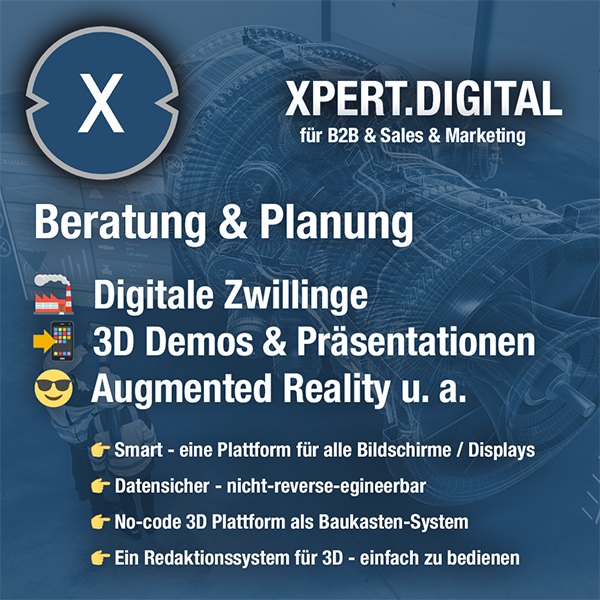Reality Labs: billion-dollar deficit and still meta-verse optimism? Zuckerberg's strategy on the test bench
Xpert pre-release
Language selection 📢
Published on: February 1, 2025 / update from: February 1, 2025 - Author: Konrad Wolfenstein

Reality Labs: billion-dollar deficit and still meta-verse optimism? Zuckerberg's strategy on the test - Image: Xpert.digital
The future of VR and AR: Why Meta relies on the meta verse
Meta Platforms: Strategic Orientation and Future Perspectives in Metaverse
Meta Platforms continues to consistently focus on the vision of the meta-verse, despite considerable financial losses in its reality labs division. CEO Mark Zuckerberg remains convinced that the metaverse is the next large computer platform and drives investments in Virtual Reality (VR), Augmented Reality (AR) and artificial intelligence (AI) unabated.
Financial situation and development 2024
Reality Labs recorded an operational loss of $ 4.97 billion in the fourth quarter of 2024 with sales of only $ 1.08 billion. All year 2024, the losses amounted to $ 17.73 billion, which corresponds to an increase of 10 % compared to the previous year. Since 2020, total losses have been added to over $ 60 billion. Despite this financial burden, sales in 2024 grew by 13 % to $ 2.15 billion, mainly by selling the VR glasses Meta Quest 3S and the Ray-Ban Meta Smart Glasses.
The reality LABS department remains a massive cost factor for meta. CFO Susan Li already warned of further financial losses, while Mark Zuckerberg described the year 2025 as "decisive for the metaverse". The strategy provides to develop the Horizon Metaverse platform and to open up the market for AR and AI-based wearables.
Suitable for:
- The cash machine is running: $ 62 billion! Meta's sales tsunami exceeds expectations with 59% growth
METAS Investment strategy 2025
Meta plans to distribute the financial means of Reality Labs in equal parts to two central areas in equal parts:
- Wearables (AR/AI glasses): The further development of intelligent glasses and portable technology remains a focus.
- Metaverse technologies: Investments in VR headsets, social platforms and mixed reality (MR) are also prioritized.
Zuckerberg emphasizes that these investments are necessary in the long term in order to establish the meta verse as an everyday platform. Critics, on the other hand, see the continuing losses as a sign of an ambitious strategy with an uncertain outcome.
New hardware products for 2025
1. AR and AI glasses
- Ray-Ban Smart Glasses With Display: Meta develops a new version of the smart glasses with an integrated display that can display notifications, scan QR codes and translate texts in real time. This version is scheduled to come onto the market in the second half of 2025.
- AI-based glasses: In addition to Ray-Ban, Meta works with Oakley to test AR glasses for athletes. In addition, full-fledged AR glasses are being planned for 2027.
- Orion project: The AR prototype "Orion" should enable a fully immersive 3D experience, but faces challenges such as high production costs and limited battery life.
Suitable for:
- Meta Artemis Ki-Chip and Artemis AR glasses
- Meta is planning Oakley smart glasses “Supernova 2” and “Hypernova” for this year – as well as AR glasses “Artemis” for 2027
2. Innovative input devices
- Neuronal bracelet: A bracelet in development uses neuronal signals to enable the control of AR and AI glasses by means of thought or the smallest hand movements.
- Smartwatch with neuronal control: Meta plans to publish a smartwatch that, in addition to fitness tracking, also allows direct neuronal interaction with other devices.
3. Mixed reality developments
- Meta Quest 3S: The VR glasses are intended to improve mixed reality functions with a new PASSHROUGH API that enables developers to use the quest cameras more precisely.
- Improvements on the Horizon platform: The Metaverse ecosystem is visually upgraded to enable more and more user experience.
Metas Metaverse: Why the journey to profitability is still bumpy
Despite technical progress and ambitious product developments, Metas Metaverse plans face major challenges:
- Profitability: VR and AR headsets alone are not enough to make reality Labs profitable. The monetization of the metaverse remains a central task.
- Market acceptance: While VR glasses operate a niche, the mass acceptance of AR glasses remains unsafe. So far, many users have no clear added value.
- Technological hurdles: battery life, processing performance and user -friendliness are central aspects that have to be further optimized.
Suitable for:
Financing through the core business
Reality Labs is financed by METAS strong advertising business. In 2024, Meta achieved an increase in sales from 21 % to $ 48.4 billion in the area of digital advertising. These income enables the group to invest billions in metagers. This is a strategic risk: While the advertising business proves to be highly profitable, the future prospects of the meta verse are uncertain.
A bet on the future
With its investments, Meta relies on one card: the vision of a networked digital future in which AR, VR and AI expand the physical world. Whether this strategy will work depends on many factors - including technological breakthroughs, market acceptance and the ability to make the meta -verse profitably. While Zuckerberg remains optimistic, the critics are numerous. The next few years will show whether Metas Metaverse strategy will become a revolutionary success or a costly failure.
🗒️ Xpert.Digital: A pioneer in the field of extended and augmented reality
Mark Zuckerberg's ambitious plan for the world of tomorrow - background analysis
Meta continues to focus on an ambitious vision of the future
Despite persistent financial challenges and considerable losses in his meta-verse division Reality Labs, Meta Platforms continues to focus on ambitious vision of the future. Under the direction of CEO Mark Zuckerberg, the idea is unabated to combine digital and physical worlds into a seamless, new computer platform. For example, Zuckerberg sees the metaverse as the “the next computer platform”, which not only could revolutionize the way we communicate, but also how we work, play and live.
Financial challenges and massive investments
In the fourth quarter of 2024, Reality Labs had operational losses of $ 4.97 billion, although sales were only $ 1.08 billion during this period. The losses add up to $ 17.73 billion to the entire year 2024-an increase of 10 percent compared to the previous year. These figures underline that Meta is faced with enormous financial challenges despite impressive hardware successes and innovative product developments. Since 2020, the development costs in the reality LABS division have been adding up to over $ 60 billion, which reflects the high investment needs for the establishment of the meta-verses.
Hardware successes and strategic shifting
An essential driver of sales growth in 2024 was the success of products such as the Meta Quest 3S-VR glasses and the Ray-Ban Meta Smart Glasses. These hardware products were able to achieve an increase in sales of 13 percent and showed that innovative technical solutions can certainly arouse consumers' interest. Nevertheless, the development costs far exceed the income, which is why the financial budget in this area remains tense. The strong sales figures from the core business, especially in the advertising area-which rose by 21 percent to $ 48.4 billion in 2024-META enables billions to continue to invest in future projects. This represents a strategic risk, the long -term success of which has so far remained uncertain.
Ambitious orientation for 2025
The strategic orientation for 2025 is promising and ambitious. Zuckerberg describes the coming year as “crucial for the meta verse” and promises significant visual improvements for the Horizon platform, which serves as a prototype for immersive meta-verses. In addition to these improvements, Meta also plans to test new AI-based glasses, including cooperation with Oakley. These new developments show that Meta not only relies on VR headsets, but also increasingly on augmented reality (AR) and artificial intelligence (AI) as future technologies.
Targeted investments in 2025: wearables and meta-verse technologies
An interesting detail of the investment strategy is the distribution of available funds for reality labs in 2025: 50 percent should flow into wearables such as AR and AI glasses, while the other half into the further development of meta-verse technologies such as VR headsets and social platforms is invested. This balanced distribution signals that Meta works equally on the improvement of the user experience in metaverse and the creation of new, accessible technologies for the mass market. However, CFO Susan Li warns that these investments could lead to increasing losses, but at the same time indicates the fundamental importance of these projects for the future of the company.
Long -term vision: fusion of digital and real worlds
The long -term perspective of meta is also characterized by a clear vision: the fusion of digital and real worlds. CTO Andrew Bosworth emphasizes that the reality labs turns increased by 40 percent in 2024 and at the same time the user numbers of the quest devices are continuously increasing. These developments show that despite the current financial challenges there is a clear growth potential in the use of VR and AR. Critics, on the other hand, emphasize that the sole use of VR headsets will hardly be sufficient to achieve sustainable profitability and that the breakthrough of AR glasses is still a long way off.
Innovative hardware developments for the consumer and B2B market
The upcoming hardware innovations are diverse and aim to operate both the consumer market and professional areas of application. For example, Meta develops a new generation of AR glasses in the style of the Ray-Ban Smart Glasses that have an integrated display. These glasses should display notifications, scan QR codes and even translate texts in real time. An upgrade of these models is planned for the second half of 2025, in which the combination of AR and AI is in the foreground. Such a product could revolutionize the everyday life of users by enabling seamless integration of digital information into the physical environment.
Suitable for:
Revolutionary technologies: neural bracelets and smartwatches
At the same time, work is done on a new input device: a neural bracelet that enables gesture control and reacts to neural signals. In the future, this technology could fundamentally change the way people interact with their devices by allowing intuitive and almost immediate control. This concept is complemented by the development of a smartwatch, which also integrates a neural interface. This smartwatch should not only operate fitness tracking, but also have advanced control options that are synchronized directly with the new AR glasses.
In the area of mixed reality innovations, the focus is on the Meta Quest 3S. This VR glasses supports the spread of mixed reality and offers developers access to the cameras of the quest devices with special PACKROUGH-API. This enables more precise environmental interactions, which leads to an improved user experience. In addition to the hardware, the further development of the Horizon platform is also being worked on. Visual updates and optimizations should help to make the meta -verse even more inevitable and more appealing, which could also pave the way for new business models and applications in the long term.
Another milestone in product development is the work on the prototype "Orion", an AR glasses that can show 3D content into the real world. Despite the promising technology, this project faces significant challenges, such as high production costs and a previously limited battery life. Meta is working intensively to overcome these hurdles in order to develop an everyday version of this glasses, which is not only technically mature, but also meets the demands of consumers. At the same time, Meta tests the market acceptance of AR glasses in cooperation with Oakley, which are specifically aimed at athletes. This project could enable entry into a largely undeveloped market and open up new target groups. In addition, META is already planning the development of full-fledged AR glasses for 2027, which should play an important role in both the consumer area and in professional applications.
The strategic investments that META have made in the coming years are therefore an essential part of the corporate philosophy. Despite the fact that further losses can be expected at short notice, it becomes clear that the long -term focus on innovative technologies and the creation of a holistic meta verse is assessed as future -oriented. As CFO Susan Li emphasizes, these investments are essential to establish the next generation of networked technologies. The company relies on a balanced mix of proven core transactions and future -oriented projects in order not only to be able to exist in the long term, but also to be considered a pioneer in digital transformation.
Union of the vision of meta, digital and physical worlds goes far beyond the development of individual hardware products. It is about creating an ecosystem in which people interact, work and develop in a new, immersive environment. This vision is carried out by a deep conviction that technological innovations-from neural interfaces to mixed reality applications-will fundamentally change the way we perceive and shape our world. Not only the technical implementation plays a role, but also the creation of user experiences that are intuitive, appealing and, above all, useful.
Despite the current financial challenges and the high investment amounts, Meta Platforms stuck unexpectedly in its long -term vision. The continuous development of new hardware products and innovative technologies in the area of VR, AR and KI should not only serve today's market, but also pave the way into a digital future in which the boundaries between the real and virtual world are increasingly blurred. With a clear strategic orientation and an unshakable belief in the potential of the meta verse, Meta positions itself as a pioneer in an era that will be shaped by radical technological upheavals. The coming years will show whether these ambitious investments and visions will actually bring the hoped -for breakthrough - a breakthrough that has the potential to redefine our entire understanding of computers and digital interaction.

We are there for you - advice - planning - implementation - project management
☑️ SME support in strategy, consulting, planning and implementation
☑️ Creation or realignment of the digital strategy and digitalization
☑️ Expansion and optimization of international sales processes
☑️ Global & Digital B2B trading platforms
☑️ Pioneer Business Development
I would be happy to serve as your personal advisor.
You can contact me by filling out the contact form below or simply call me on +49 89 89 674 804 (Munich) .
I'm looking forward to our joint project.
Xpert.Digital - Konrad Wolfenstein
Xpert.Digital is a hub for industry with a focus on digitalization, mechanical engineering, logistics/intralogistics and photovoltaics.
With our 360° business development solution, we support well-known companies from new business to after sales.
Market intelligence, smarketing, marketing automation, content development, PR, mail campaigns, personalized social media and lead nurturing are part of our digital tools.
You can find out more at: www.xpert.digital - www.xpert.solar - www.xpert.plus
























